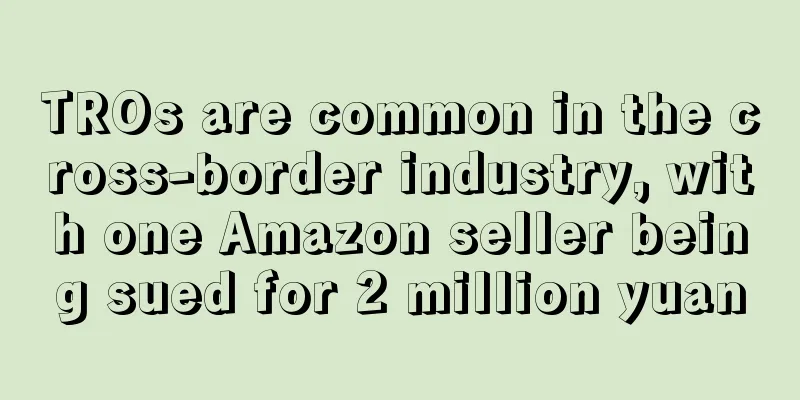TROs are common in the cross-border industry, with one Amazon seller being sued for 2 million yuan

|
One seller lamented: "Cross-border e-commerce is surrounded by ambushes from all sides. If you want to stand out, you will have to suffer a lot."
Infringement is one of the most common traps for cross-border e-commerce sellers. According to feedback, temporary restraining orders (TROs) have occurred frequently this year, so sellers must be careful to avoid them. Moreover, many of the cases are related to conventional products, and it is usually difficult to predict whether they will have patent issues. In another case, the product is safe when the seller makes a query, but a TRO comes soon after, so it is necessary to check regularly. Is TRO prevalent this year?
Some time ago, a card-issuing seller said that he was made to laugh by a foreign lawyer, because the lawyer said that his product infringed his rights and he had to pay a compensation of 300,000 U.S. dollars (about 2.14 million yuan), or he could complain to Amazon. "Are these foreigners crazy because of poverty? Their products are worth very little."
In the cross-border circle, "infringement" is a high-frequency word, and there are few sellers who have never encountered infringement complaints. "I have received three TROs in total, some of which I didn't sell a single order, and some of which were taken off the shelves for a year and then found by me," said a clothing seller. In the end, he had no choice but to pay money to settle.
Many times, sellers are afraid of TROs not only because they need to pay compensation, but also because time cost is an important consideration. Some rogue law firms take advantage of the fact that sellers cannot afford to waste time, frequently attacking and asking for exorbitant fees.
According to sellers’ feedback, TRO cases are high this year, and people are often sued. Regardless of whether there is an order or not, once you are targeted, it is difficult to escape without paying money to settle.
One seller said that in March this year, he only sold one product, which was found by GBC. His account was frozen for three months, and he finally paid nearly 5,000 US dollars to resolve the issue.
Another seller also said that he was recently TROed because of a word, and the account funds could only be deposited but not withdrawn. Later, he paid a compensation of 5,000 US dollars to settle the matter. And this is the second time he has been cheated because of a word being registered as a trademark (brand). "The last time, the account was frozen for more than 300,000 US dollars. In the end, we negotiated a settlement and compensated 15,000 US dollars."
In response to rogue TROs, some sellers choose to spend money to defend themselves, rather than tolerate them, but this is rare. However, overall, whether it is a settlement or a defense, it is inevitable to bear certain losses. In addition to paying settlement money or attorney fees, it will also take a lot of time. Often, by the time the matter is resolved, the opportunity to sell has already been missed.
Why are TRO cases so frequent this year?
Some sellers analyzed that the current platform profits are shrinking and competition is intensifying. In this situation, many people try to gain competitive advantages through some informal means, such as launching patent wars.
However, in addition to the reasons mentioned by the sellers, Yien believes that more and more people outside the industry are trying to gain profits through cross-border infringement claims, and this phenomenon is also closely related to the current situation.
Husband-and-wife shop earns tens of millions of yuan a year from TRO
Cross-border e-commerce sellers have suffered from TRO for a long time. However, many people may not realize that many of these cases are actually secretly promoted by some people with ulterior motives.
Sellers may have heard such things: "A couple earns tens of millions a year from TRO" or "A small team of four earns 25 million a year from infringement claims"...
Sellers are often shocked to see this news and worry about their own shops. However, some people with bad intentions see this as an opportunity to make a profit. This year, many people have flocked to this track, and a hot word "shop-cutting" has been born.
The so-called "cutting the market" means using data to extensively screen new products with potential or in the rising stage on the platform, and then register patents. Once the product starts to sell well and the patent application is successful, TRO is used to claim compensation from other sellers.
According to some information that has been exposed, "intercepting" now not only has a complete process, but has also developed into a complete industrial chain. At the same time, some training institutions are continuously sending those who want to speculate to the cross-border circle.
In fact, "shop interception" was previously called "cross-border infringement claims", but no matter how it changes, it is aimed at cross-border e-commerce sellers. Since they are indeed the owners of the copyright, sellers often have to suffer losses in silence.
It is reported that among many sites, the United States is often the favorite of "shop-cutting" people, and they specifically target Chinese sellers. Some even start to claim compensation from sellers during the trademark/patent registration period. "My friend was TROed some time ago, and the subsequent trademark was not registered, but because of the time difference, he still lost some money in the end."
Patent trolls are making money so quickly that one seller lamented, "I feel like switching to this line of work might make more money than working for Amazon."
Judging from the current feedback, most of the people who "cut off the shop" are Chinese. "The person who complained to me actually registered hundreds of patents, and all of them are from 1688 styles." A seller said angrily.
Amazon is cracking down
In response to the rampant patent/trademark hooliganism, the industry has already taken some measures. For example, some companies have developed TRO warning and appearance patent query systems.
And this situation has also attracted the attention of Amazon. According to the latest official news, Amazon's Counterfeit Crime Unit (CCU) has filed lawsuits against multiple bad actors.
Amazon alleges that these bad actors applied for and obtained invalid trademarks for entry into Amazon Brand Registry and submitted a large number of false infringement notices in an attempt to have Amazon's selling partners and their products removed from the store. These false removal notices attempt to reduce product selection, harming the interests of Amazon's selling partners and customers, thereby undermining the integrity of the Amazon store.
In the lawsuit, Amazon also named two other defendants who facilitated bad actors: an attorney sanctioned by the USPTO for violating the USPTO Code of Conduct, and a company called Asin Enterprise Management Consulting Ltd. Both filed invalid trademark applications on behalf of clients and assisted clients in obtaining brand registration privileges for a fee.
Amazon said that when bad actors’ customers improperly enter brand registry, they submit false infringement notices to honest selling partners, making customers more likely to purchase the same products from the bad actors.
The lawsuit is reportedly part of a new offensive against abuse notification submitters of Amazon's selling partners and is another lawsuit after the company first filed such a lawsuit in 2023.
"This lawsuit sends a clear message that Amazon will take every step to hold bad actors accountable and support our selling partners," said Kebharu Smith, director of Amazon's CCU department. The defendants in this case intentionally deceived Amazon's selling partners, customers and stores, or facilitated deceptive behavior. The lawsuit aims to shut down the defendants' operations and prevent them from harming others throughout the retail supply chain. TRO Cutting Infringement claims |
>>: Beware! A large number of Amazon sellers have been overcharged
Recommend
What is AMZDiscover
AMZDiscover is a tool for mining Amazon reviewer ...
What is hoablronhouseware? hoablronhouseware Review, Features
Hoablronhouseware mainly sells kitchen knives, com...
With an average annual consumption of £500 per person, the pet economy in the UK is booming
Compared with the domestic pet economy, which is ...
What is Weikai E-commerce? Weikai E-commerce Review, Features
Weikai E-commerce uses Shopee’s cross-border freig...
Generac products have safety risks, more than 300,000 units have been recalled!
Recently, Generac, an American power generation p...
Amazon sellers cry as platform takes over 50% commission
According to data released by the statistics agen...
Sales reached 31.6 billion euros! Amazon Germany has strong consumer power
Are you still sticking to Amazon in the new year?...
25 million units sold in two years, air fryers are hot sellers in the US
According to the NPD Group 's continuous trac...
US e-commerce demand for multiple categories will grow in 2022
Recently, emarketer analyzed the US e-commerce ma...
What is Anchorage Digital? Anchorage Digital Review, Features
Anchorage Digital is a digital asset bank. About ...
What is edecoa? edecoa Review, Features
Edecoa is one of the world's leading companies...
More than 1 million cleaning products have been recalled. This Chinese-made product is sold on multiple platforms
Sun Rise Trading , based in Hong Kong, China, has...
What is UniTeller? UniTeller Review, Features
UniTeller , a subsidiary of Grupo Financiero Bano...
What is Rael? Rael Review, Features
Rael is an online store that sells feminine produc...
What is Temple & Webster? Temple & Webster Review, Features
Temple & Webster was founded in 2011 and focu...









